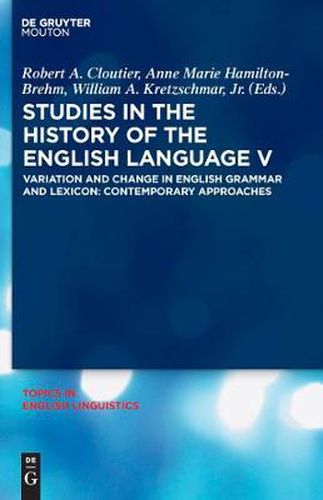Readings Newsletter
Become a Readings Member to make your shopping experience even easier.
Sign in or sign up for free!
You’re not far away from qualifying for FREE standard shipping within Australia
You’ve qualified for FREE standard shipping within Australia
The cart is loading…






This title is printed to order. This book may have been self-published. If so, we cannot guarantee the quality of the content. In the main most books will have gone through the editing process however some may not. We therefore suggest that you be aware of this before ordering this book. If in doubt check either the author or publisher’s details as we are unable to accept any returns unless they are faulty. Please contact us if you have any questions.
This collection of essays focuses on current approaches to variation and change in historical English grammar and lexicon. Of the twelve papers in the collection, half are based on grammar and syntax, half on lexical developments. The volume highlights the contributions that strong empirical research can make to our knowledge of the development of English grammar, especially as realized in lexical development. In illustration of contemporary research trends, the articles in the collection make strong use of extralinguistic factors to discuss language change as well as argue for internal and structural development.
The authors are drawn from nine different countries, and each article is followed by a commentary and response that provide actual dialogue about the issues in the field, thus representing world-wide discussion of issues in the history of English. The essays recognize the different audiences for historical variation and change - formal linguists, sociolinguists, and lexicographers - and specifically address the interests and discourse in those areas.
The volume shows how historical studies of English are increasingly engaged with contemporary trends in linguistics, at the same time as demonstrating how empirical and other methods can bring classical philology fully into the sphere of contemporary linguistics without abandoning its traditional concerns.
$9.00 standard shipping within Australia
FREE standard shipping within Australia for orders over $100.00
Express & International shipping calculated at checkout
This title is printed to order. This book may have been self-published. If so, we cannot guarantee the quality of the content. In the main most books will have gone through the editing process however some may not. We therefore suggest that you be aware of this before ordering this book. If in doubt check either the author or publisher’s details as we are unable to accept any returns unless they are faulty. Please contact us if you have any questions.
This collection of essays focuses on current approaches to variation and change in historical English grammar and lexicon. Of the twelve papers in the collection, half are based on grammar and syntax, half on lexical developments. The volume highlights the contributions that strong empirical research can make to our knowledge of the development of English grammar, especially as realized in lexical development. In illustration of contemporary research trends, the articles in the collection make strong use of extralinguistic factors to discuss language change as well as argue for internal and structural development.
The authors are drawn from nine different countries, and each article is followed by a commentary and response that provide actual dialogue about the issues in the field, thus representing world-wide discussion of issues in the history of English. The essays recognize the different audiences for historical variation and change - formal linguists, sociolinguists, and lexicographers - and specifically address the interests and discourse in those areas.
The volume shows how historical studies of English are increasingly engaged with contemporary trends in linguistics, at the same time as demonstrating how empirical and other methods can bring classical philology fully into the sphere of contemporary linguistics without abandoning its traditional concerns.